Ghost Gear: One Ton of Fishing Waste Removed from Lastovo Seabed
October 19, 2021 - A ton of fishing waste was removed from the Lastovo seabed in an action that successfully cleaned 23 locations.
Every year, about a million tons of 'phantom' fishing gear end up in the seas, which take up to six years to decompose. Thus, the Adriatic Sea, as part of the Mediterranean Sea, which is considered one of the most polluted globally, becomes a graveyard of plastic.
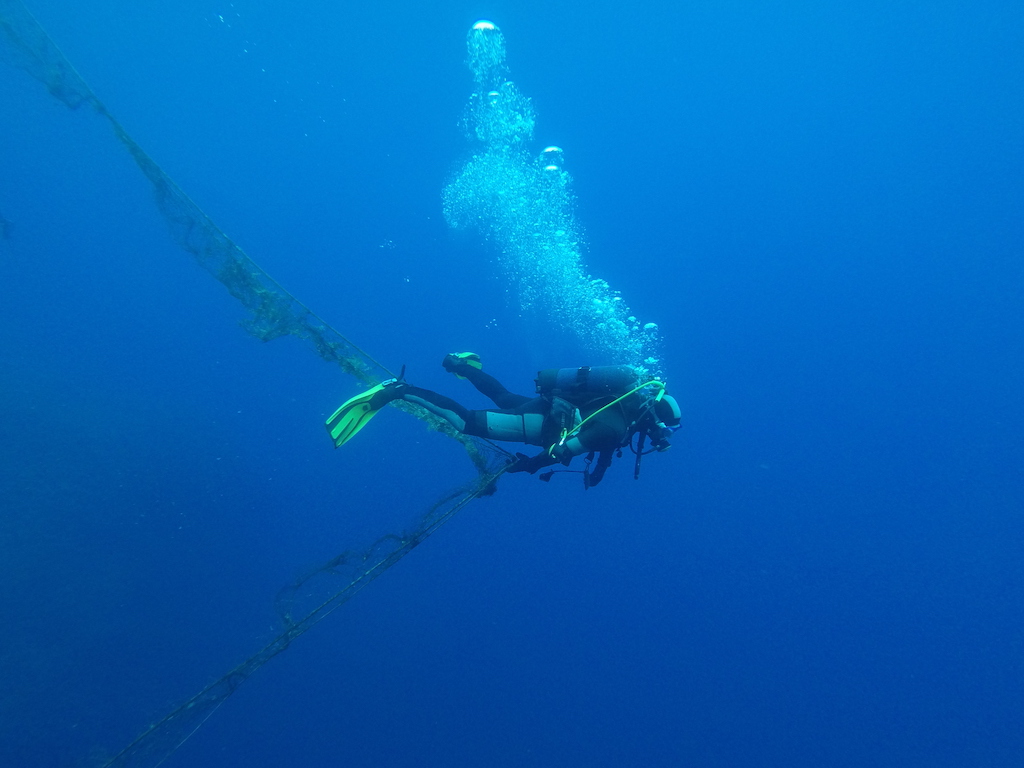
Marko Frlan
The Mediterranean Sea is known as one of the most polluted globally, with as much as 95% of plastic waste in the sea and on beaches. Consequently, the Adriatic Sea is under siege by plastics. As much as 50% of all waste from marine sources relates to leftover, lost, abandoned fishing gear or 'phantom fishing gear.' To raise awareness of this burning problem, but primarily to clean the seabed itself, the World Conservation Organization WWF organized an action to clean the Lastovo seabed of phantom fishing gear. In a few days, about a ton of material was removed.
Fabijan Peronja from WWF Adria explains how fishing tools kill life in the sea and harm all of us because they fail to decompose even in 600 years.

Neven Marinic
"After fishers lose them, phantom fishing gear has its hunting function for decades to come. Fish, crabs, dolphins, sea turtles, and other marine organisms become entangled in nets, from which they can hardly get out and die in agony. Moreover, there is a big problem with the nets themselves: when they break down, they do not disappear but turn into microplastics that end up in our organisms through food, air, or water," says Peronja.
In addition to the sea creatures that perish in them, abandoned nets also damage fishers. This is a considerable financial expense because a network of about two hundred meters costs a minimum of 3,500 kuna. An additional problem is that this fishing gear can damage new nets and reduce fisher’s catches due to the hunting function they still have.

Neven Marinic
"The cooperation of fishers and divers is essential because it allows the net to be removed from the sea soon after it is lost. However, this way of working is not profitable due to the cost of diving, which, depending on the depth of the sea and location, is almost equal to the cost of the new net," explains Peronja and adds that as many as 30 different locations contaminated with fishing tools were mapped on Lastovo, of which 23 sites have been successfully cleared of nearly a ton of fishing gear.
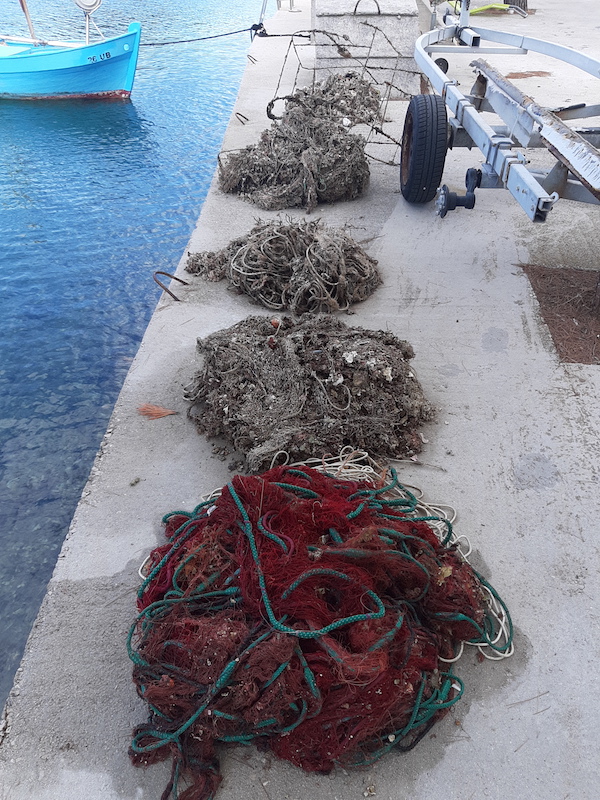
Marko Frlan
"The work is not even close because the deadliest form of plastic pollution is everywhere, and we should find a model of cooperation for cleaning other locations and find a way to do it regularly. We believe that the business sector could help us achieve such cooperation and participate in nature protection in a way that is positive for the state of the sea and for the people who depend on it," concludes Peronja.

Ante Guic
WWF carried out the Lastovo cleaning action through its project "Ghost gear," in cooperation with the Lastovo diving centers Ankora and Ronilački raj and the Zagreb diving club DPS Zagreb. Abandoned nets and other forgotten fishing tools have significant environmental, economic, and social consequences for marine organisms, fishers, all those who live by the sea, and each of us.
See how the underwater cleaning campaign went in the video below:
For more, make sure to check out our dedicated lifestyle section.
Give Fish a Chance: Smog-Eating Augmented Reality Mural in Zagreb Revealed
June 9, 2021 - A smog-eating augmented reality mural in Zagreb was revealed on World Oceans Day!
A large sea mural has sprung up in the capital city, in the neighborhood where the streets are named after the islands. It is the result of a collaboration between WWF Adria, artist Boris Baret, animator Mate Žaja, and Duje Stojak.
On World Ocean Day, Zagreb's Sigečica district, where the streets are named after the Adriatic islands, got what it was missing - the sea! The mural titled "Give fish a chance" is special for at least two reasons. The first is that it is adorned with an additional layer of augmented reality activated by a smartphone or tablet. All you need to do is install the Artivive application for free, walk to Rapska 26b, scan the mural and bring the sea to life on the screen of your device. This is the first such mural in Croatia, and another is coming to Split.
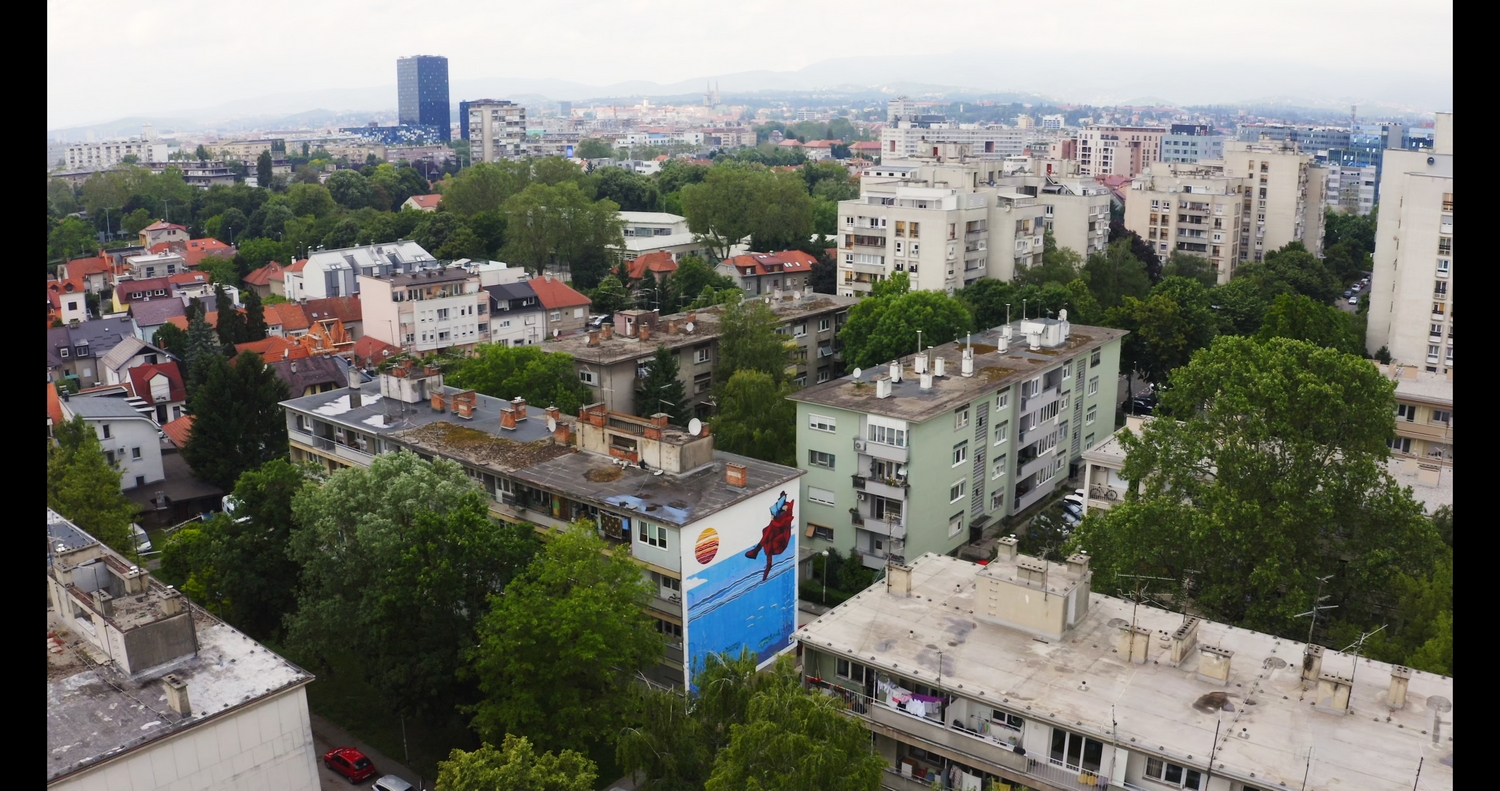
Ante Gugic
Another special feature is the paints used, which eliminate the main pollutants present in the air (including nitrogen oxides harmful to human health) and prevent the growth of bacteria, mold, and spores. The manufacturer states that an area of 100 square meters of this color acts like a forest of the same area. Certainly, no color can replace the services and benefits of trees, but in a city with minimal greenery per capita, it cannot rest.
The mural is part of the pan-European Fish Forward project to raise awareness of the social and environmental impacts of consuming fishery products. The sea feeds much of the world's population, and most fish stocks are overfished. The European Union is among the largest importers of food from the sea, and half imports from developing countries, where nearly a billion people depend on the sea as their main source of food and income.
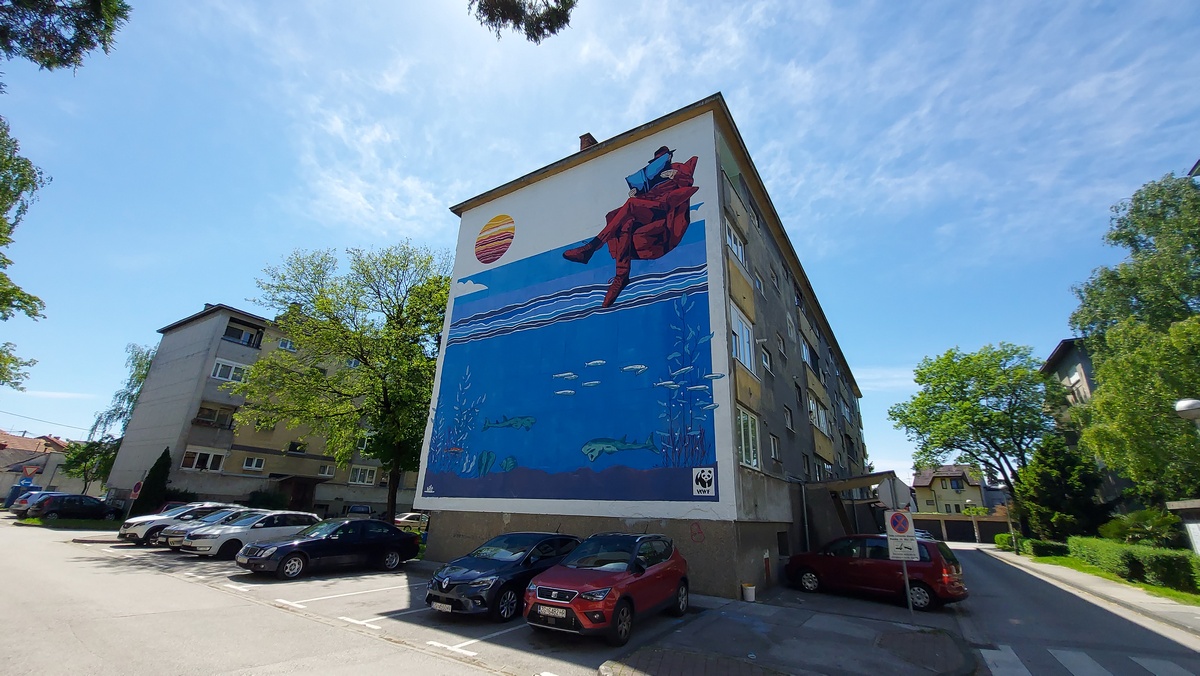
Ante Gugic
Changes are not only happening in the distant oceans; they are also present in the Adriatic, which you can measure by your own experience. If you had the opportunity to dive into the sea 30 years ago and today, you know that these are two completely different worlds. This is confirmed by a group of international scientists on the island of Molat, who in recent days led by WWF Adria in search of Squatina squatina, once widely represented, today critically endangered and strictly protected species of shark.
“Due to intensive fishing, we have brought this species almost to extinction. Recently, one young specimen was caught as an accidental catch and returned to the sea thanks to a conscientious fisherman and the Pula Aquarium. It is important to know that many species face a similar fate which will also affect food security. Protection and recovery are possible by introducing measures such as non-fishing zones," says Patrik Krstinić from WWF Adria.
Squatina squatina is also on the Zagreb mural, and as it must not remain alive only as augmented reality, in the decade ahead, the responsible and sustainable use of marine resources is crucial so that we can continue to use the services they provide us.
"We take much more from the sea and much faster than 50 years ago. We do not give it time or space to recover. People depend on food production, which in turn depends on healthy habitats. That is why it is essential to protect at least 30% of the world's seas and oceans by 2030. Today, only 7% is under some form of protection, which is insufficient," concludes Petra Počanić, Fish Forward project manager at WWF Adria.
For more on lifestyle in Croatia, follow TCN's dedicated page.
World Environment Day Dedicated to Ecosystem Restoration
ZAGREB, 5 June 2021 - World Environment Day is observed on 5 June and this year it is dedicated to the restoration of ecosystems, whose resources are the foundation of the social and economic progress of humankind as well as people's health and wellbeing, Croatia's Economy and Sustainable Development Ministry has said.
Ecosystems play a significant role in the prevention of health crises such as COVID-19 because by destroying natural ecosystems, people have significantly increased the risk of illnesses passing from animals to people.
The ministry says the necessity to protect nature and the environment is also reflected in the fact that, according to the World Economic Forum, half the global GDP ($40 trillion), depends moderately or strongly on nature.
Given that many ecosystems have been irreversibly destroyed and others considerably degraded, our survival depends on the speed of action and clear international community coordination for their preservation and renewal, the ministry says.
Therefore the United Nations Environment Programme, first with a resolution on 1 May and then with the Decade on Ecosystem Restoration movement, which symbolically kicks off with this year's World Environment Day, has called on all governments, the business sector, the expert and scientific community, and the wider public to prevent further degradation of ecosystems and to ensure a future for the generations to come, the ministry says.
That's why it's necessary to raise public awareness of the fact that humankind spends by the middle of the year the Earth's capacities that should suffice all year, it adds.
Ecosystem restoration, together with transition to a circular economy and a climate-neutral society, can simultaneously prevent poverty, hunger, loss of biodiversity, climate change, and uncertain access to drinking water, the ministry says.
The director of Greenpeace Croatia, Zoran Tomić, has told Hina that it's important to make cities greener and enable them to really recover.
City and local authorities now have the opportunity and duty to launch ecological transition to alleviate the effects of climate change and health crises, he says.
WWF Adria has called on citizens to demand of the authorities to implement concrete nature protection measures and support, through various campaigns, all those who contribute to nature preservation and protection.
Animal Friends Croatia has announced that on the occasion of World Environment Day, it will send all Croatian MPs a brochure on food and the ecology to explain the link between breeding animals for food and world hunger, global warming, water consumption and deforestation.
For more about ecology and environment in Croatia, follow TCN's dedicated page.
WWF, Union for Mediterranean Call for Better Water Management
ZAGREB, 22 March 2021, 2021 - The World Wide Fund for Nature (WWF), an international organisation for environmental protection, called on Monday, on the occasion of World Water Day, for better water management and protection and preservation of water resources.
Global demand for water grows every year and it is estimated that by 2050 it will grow by up to 55%, mostly due to growing production, the WWF said.
At the same time, almost two-thirds of the global population face water restrictions at least for a month in a year.
Challenges and risks to the availability of water will grow bigger every year if we do not change the way we treat water and understand that it is a limited resource, the WWF Adria said.
Croatia is rich in drinking water, which is why the availability of drinking water is often taken for granted, the organisation said.
For decades water resources have been poorly managed - from pollution with wastewater and waste, construction of small hydropower plants and unsustainable dams to uncontrolled gravel and sand excavation, cutting of forests near rivers and sealing of soil and natural water courses, it said, stressing that there was still time for stopping the crisis and calling on everyone to be a part of the solution.
The Union for the Mediterranean, an organisation bringing together 42 countries of the EU and the Southern and Eastern Mediterranean, including Croatia, warned today that many Mediterranean countries were faced with water shortage, a problem additionally exacerbated by the coronavirus pandemic, in which additional quantities of water are used for hand washing.
The Barcelona-based organisation notes that hand washing due to coronavirus has increased daily water consumption from 9 to 12 litres per household.
The average demand for water in Mediterranean countries has increased by 5% over the past 12 months due to anti-epidemic measures, it noted.
The chair of the Croatian parliament's committee on agriculture, Marijana Petir, too, today issued a message for World Water Day, calling for responsible management of water resources.
To read more news about lifestyle in Croatia, follow TCN's dedicated page.
International Mountain Day Encourages Conserving Mountain Biodiversity
December 11, 2020 – On the occasion of International Mountain Day, which is marked worldwide today, the Croatian Mountaineering Association, WWF Adria, and Parks Dinarides called for mountain biodiversity preservation.
Biodiversity is the theme of this year's International Mountain Day, which is being celebrated around the world today. The UN General Assembly proclaimed this day in 2002 to highlight mountains' significance for nature and people.
Croatian mountains perfect for hiking
The Croatian Mountaineering Association, the largest Croatian association, dedicated to environmental protection, points out that we should not forget that the Croatian mountains are unique in the world precisely because of their great diversity in a small area.
"The tallest Croatian mountains belong to the Dinaric mountains, and ecologically extremely sensitive karst relief is what characterizes them. They stretch in a northwest-southeast direction, along the Adriatic coast in several parallel rows, starting with the island mountains.
Unlike the Dinarides, the Pannonian and Peripannonian mountains are mostly old geological structures, with milder slopes, relatively low, and rich in water and vegetation. Their direction of stretching is not unique, but nowhere does it coincide with the Dinaric. They are characterized by the abundance of watercourses that have cut deep valleys over the centuries and thus created a colorful relief.
Due to the low altitude compared to the world's highlands, most of the Croatian peaks are relatively easily accessible for mountaineering, which makes the Croatian mountains very suitable, practically ideal for hiking," wrote the Croatian Mountaineering Association.
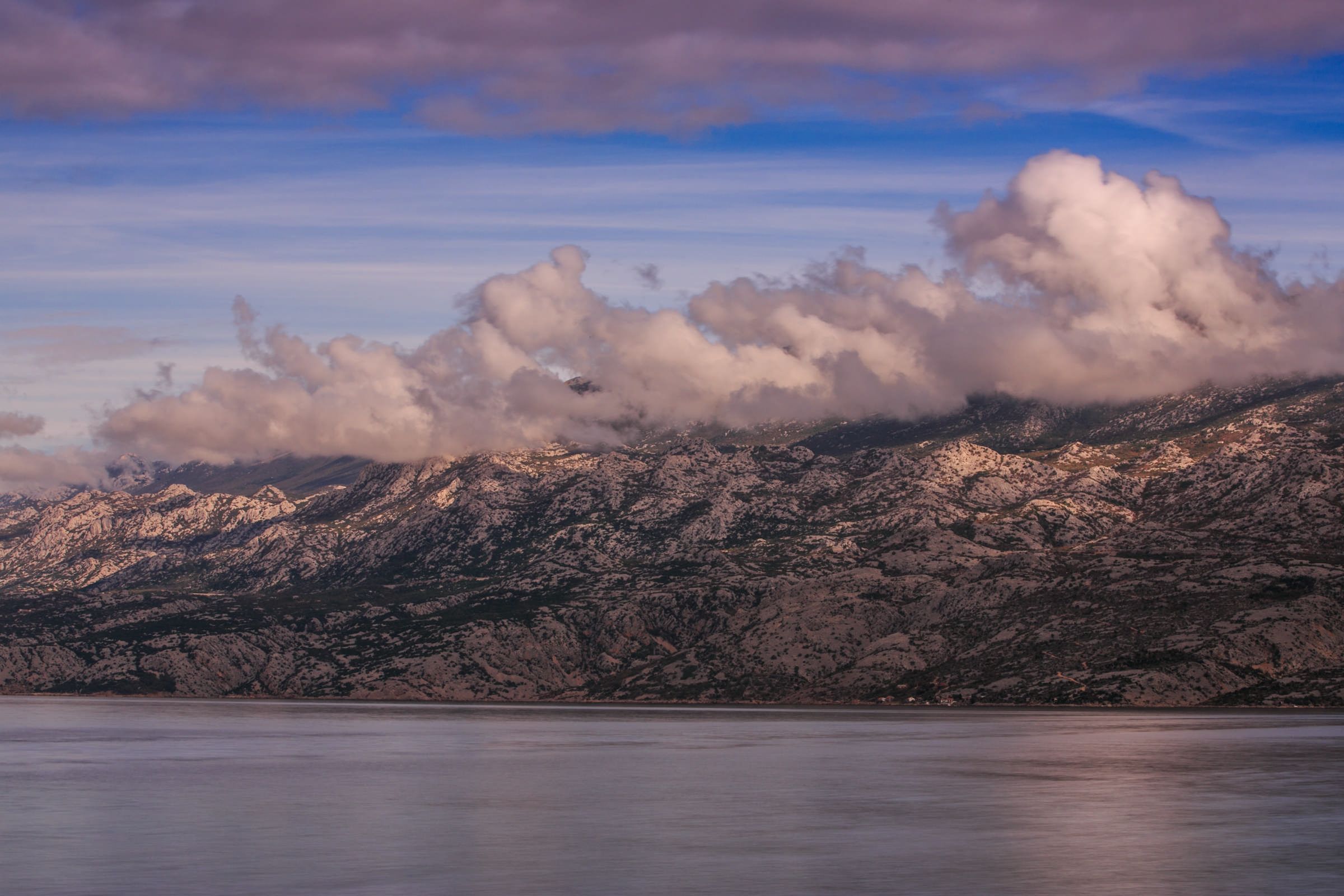
Velebit, the biggest Croatian mountain / Copyright Romulić and Stojčić
Croatian karst richness
Every year, the Croatian Mountaineering Association celebrates International Mountain Day with various actions. Still, since larger gatherings are not possible this year, they mark this day by publishing posters with messages and slogans of mountaineers on the topic "Do not leave a trace."
Next year will be the International Year of Caves and Karst, and the Croatian Mountaineering Association announces that it will mark it with a series of speleological, ecological, and promotional actions aimed at emphasizing the need for better protection of caves and karst.
In terms of karst richness, including numerous caves and pits, Croatia is among the most interesting and richest countries in Europe.
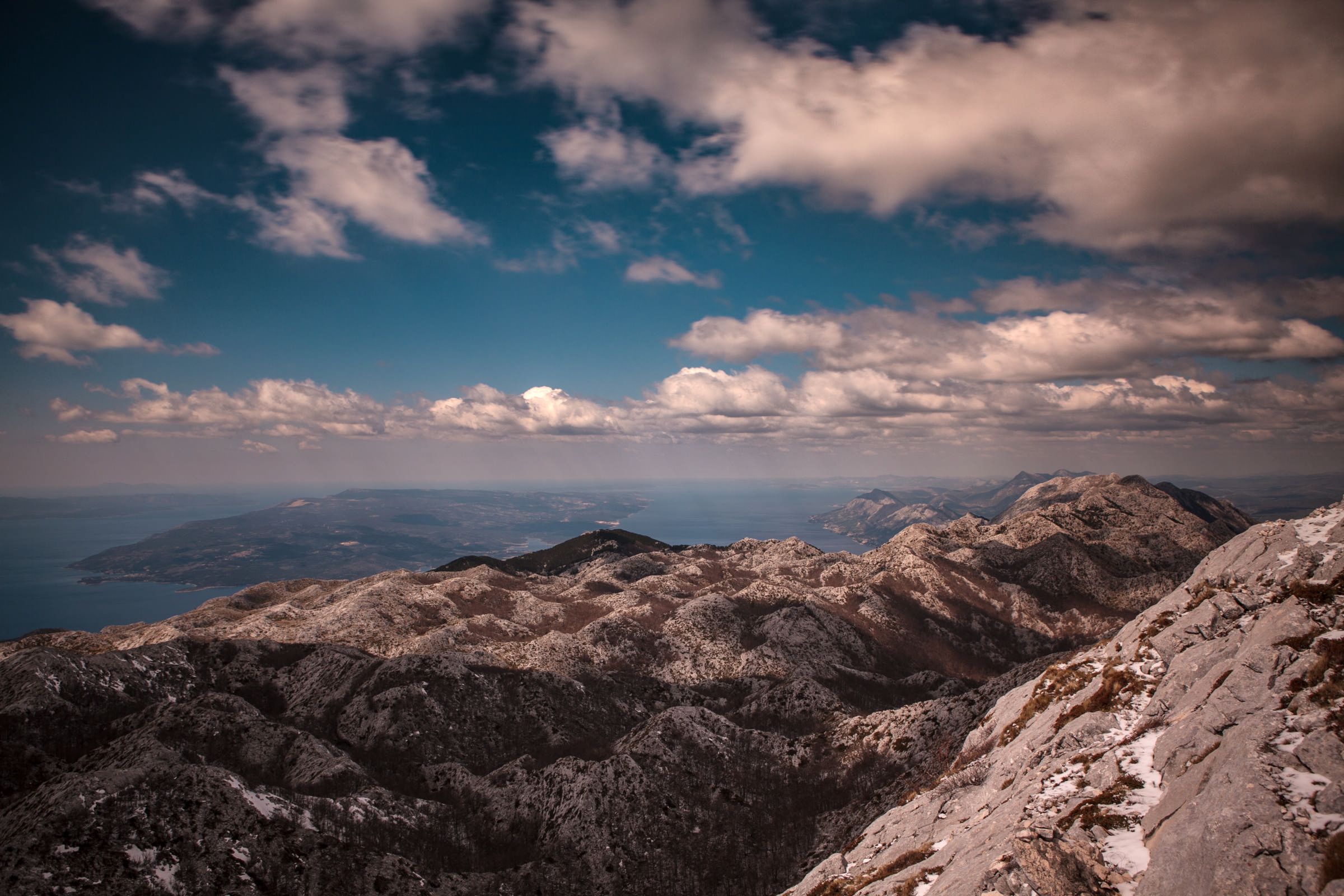
Biokovo mountain / Copyright Romulić and Stojčić
Mountain-specific policies
World Wide Fund for Nature Adria (WWF Adria) and Parks Dinarides also called on the public to preserve mountain biodiversity. At the conference about the impact of the COVID-19 pandemic on protected areas, they highlighted the sensitivity of protected areas in situations where tourism is impossible.
They emphasized that mountain biodiversity is threatened by climate change, unsustainable agriculture, mineral exploitation, deforestation, poaching, land conversion, and over-construction.
In addition to natural disasters, all this leads to a fragile and unstable environment for local communities. The most significant consequences are marginalized groups, such as communities in rural mountainous areas, who often leave their homes due to a lack of economic development opportunities. Therefore, they pointed out that one recommendation is to include mountain-specific policies in national sustainable development strategies.
To read more about lifestyle in Croatia, follow TCN's dedicated page.
Telašćica Nature Park Identified as First No-Fishing Zone in Croatia
November 24, 2020 - The first no-fishing zone (no-take zone) in Croatia has been identified in Telašćica Nature Park.
HRTurizam reports that on World Fisheries Day (November 21), the new Ordinance on fishing in protected areas, special habitats and areas with special fishing regulations for the nature parks Telašćica and Lastovo entered into force.
With the new ordinance, there are no-fishing zones in Telašćica Nature Park, or so-called "no-take" zones, which were adopted in cooperation with fishers, as well as several other measures that reduce fishing efforts in Croatia's marine nature parks. This is extremely significant news and progress, both for sustainable tourism and for the preservation of the natural habitat of fish, but also for the fishers themselves.
Great effort and credit for the introduction of no-fishing zones go to the World Conservation Organization (WWF) whose role in this process was educational and mostly diplomatic because it managed to lead all parties to a consensus on measures that could not be agreed upon for many years, although these are protected areas.
The practice so far has shown that nothing can be done only from above, by making a unilateral decision at the administrative level because the fishers do not stick to it and only deepens the conflict, points out WWF Adria and emphasizes that this is a big step for the preservation of the Adriatic, behind which stand years of work to create conditions for joint management.
"This is a great victory because for the first time in Croatia we brought no-fishing zones in cooperation with fishers who agreed to the measures, and some of which they proposed themselves, to preserve the resource from which they live. The ordinance was adopted in the right way, through the cooperation of state institutions, local fishers, and their associations dealing with the protection of the Adriatic. This is really a precedent and I hope only the first such case, especially when the effects of such measures on the renewal of the fish stock are shown," said Mosor Prvan from WWF Adria.
We can proudly say that we have a domestic example of the results of joint management, emphasizes WWF Adria, one of the first in the Mediterranean and few in the world in general.
By creating no fishing or no-take zones, we preserve the fish stock so that it can be sustainable and reproduce or "flourish", we stimulate the local economy through small local fishers, and thus through tourism and catering we have fresh fish caught that day. It is a special form of protection that completely prohibits any exploitation of the seabed for the protection of ecosystems and cultural assets, and they have proven to be excellent in preserving biodiversity, but also in economic development.
On the other hand, the fish stock is very sustainable, and when the fish stock naturally reaches too high a density of fish, it spreads to other areas - outside the no-fishing zone.
"It's all about building trust. Everyone thinks the other one has something up their sleeve, so in the end, the fishers don't trust each other, let alone the relationship between the fishers and the institutions. However, little by little, things are improving and we have agreed on a Rulebook that is not perfect nor is everyone absolutely happy with it, but it is the fruit of consensus and a good start," adds Prvan and says that this is a step towards a healthier Adriatic and more sustainable fisheries, which contributes to a better life for fishers and coastal communities.
Without fish, there are no fishers, no diving tourism, or farms… fish are the main parameter of any formula, and sustainable tourism is imperative.
Sustainable and responsible tourism must support the development of the local community because we can enable people living in these areas to stay in their areas and live well from tourism; from tourism that can and must be in line with protecting nature, said Prvan and gave an excellent concrete example through fishing tourism.
"Fishing tourism is something quite new in Croatia, and in that segment, the point is to have professional fishers who will take tourists fishing and demonstrate how fishing is traditionally done in that area. Because when a fisherman normally goes fishing, he throws about 3 kilometers of net, and when he takes tourists, he throws 300 meters of net. In this way, he has a secured income, earns more money than when fishing, and at the same time, he reduces his fishing efforts," said Prvan, concluding that it is crucial to help the local community generate income while contributing to nature protection, and that through all this, tourist products have economic value.
For the latest travel info, bookmark our main travel info article, which is updated daily.
Read the Croatian Travel Update in your language - now available in 24 languages.
Join the Total Croatia Travel INFO Viber community.
WWF and Hotel Esplanade in Zagreb Join Forces to Reduce Food Waste
WWF and Hotel Esplanade in Zagreb have joined forces through an initiative that aims at sustainability, zero food waste, and reducing environmental impact.
Esplanade Hotel is committed to implementing good practices with this strategy, with the support of WWF, to reduce the amount of organic waste it generates through its operations, reports HRTurizam on August 1, 2019.
It is estimated that around 88 million tons of food is dumped in Europe, while 1/5 of the population is at risk of poverty. The amount of food thrown away globally is more than enough to feed every hungry person on the planet. In the last 40 years, the amount of food thrown out has doubled. More than 50 million tons of fruit and vegetables grown in Europe are discarded each year just because it is distorted or the wrong size. These are just some of the worrying facts that prompted Zagreb's Esplanade to join the WWF (World Nature Organization) Global Food Waste project as the first hotel in Croatia and the region, seeking to contribute to reducing food waste and thus reducing its adverse impact on the environment and planet Earth.
"Through its responsible business and waste management program, Hotel Esplanade has for many years sought to properly and efficiently manage food by procuring, preparing, and recycling food waste, but through this initiative, the intention is to further maximize the use of food in the kitchen and restaurants. Through informative and educational messages directed at guests, we will strive to highlight this global problem. Of course, we also want to encourage other individuals and institutions to move in this direction,” said Esplanade's general director Ivica Max Krizmanić, adding that Esplanade Hotel strives for a 'zero food waste' strategy.
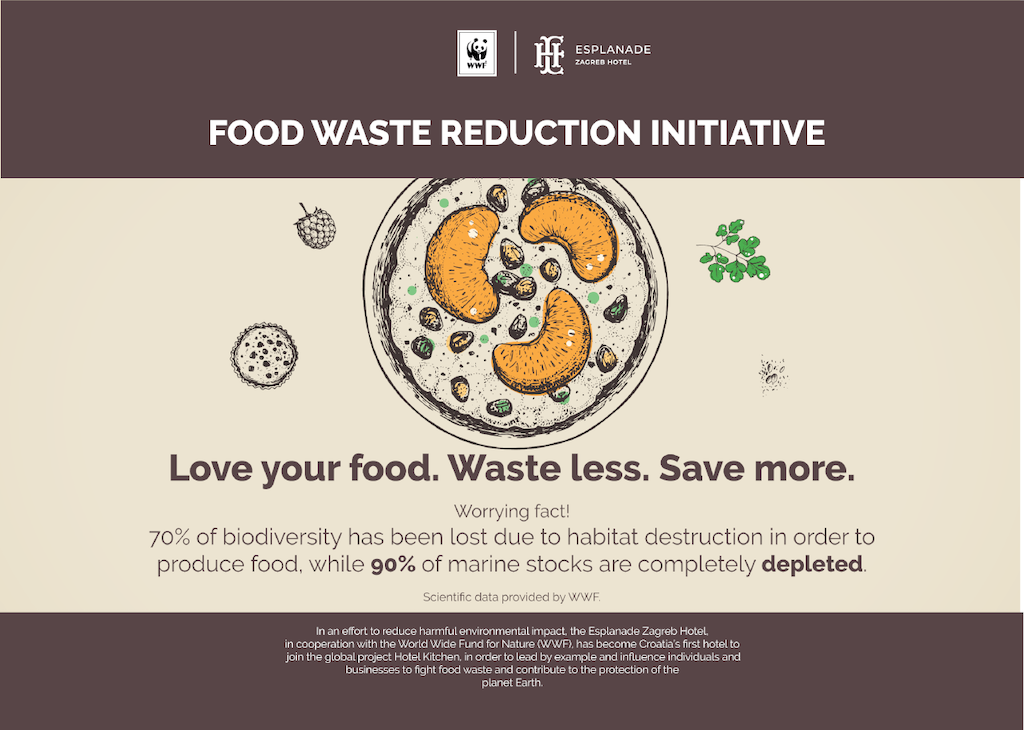
"This project is challenging, certain changes in the behavior of employees and guests in food management are necessary, but with the right tools and directional guidance, through proven methods and examples of good practice, we believe we will get measurable results," said Krizmanic.
Reducing the amount of food waste is a major challenge in the quality management of the hotel and food sector. Waste, with its vast amount and pollution in the world, is not only a severe environmental problem, but also a susceptible social factor.
“For years, we have been implementing a waste reduction strategy in the entire food and beverage business, and carefully design all our menus, but there are always situations where we can further reduce food waste. We have started this project in some segments, and the plan is to continue to spread the idea of reducing food waste throughout the business. Many of our guests and clients, especially foreign ones, are aware of this issue and welcome our initiative, but there are many who simply do not think this way, so there is the need for awareness. This is not about saving, but about reducing our environmental impact together,” said Esplanade chef Ana Grgić, adding that precise measurements of food waste have revealed that most waste is generated at places like a breakfast buffet and when organizing large events with buffet meals.
"It has been observed that guests often take in far more food than they can consume, and so they throw away dozens of kilos of food every day. Buffets offer a delicious range of enticing dishes, so, understandably, guests want to try as much as possible of what is on offer. However, the hotel regularly complements the food, so some meals will not run out during breakfast or events. In this case, the hotel will throw away the excess food. Thus, they must strive for tailored communication and encourage customers to choose the right food for their events, but also encourage guests to eat smaller portions and only consume what they can handle.
In the same way, the hotel will encourage staff to adjust their food consumption to their needs, to reduce food waste in this area as well. In addition, the hotel has a special approach to the organization of food preparation, taking into account the consumption forecast given the number of guests, their profile and, for example, their nationality, which is especially useful for dishes that take a long time to cook like štrukli, desserts, breads and the like. We believe that after informing guests and educating staff, the new measurements will produce surprisingly positive results. Through this initiative, we are thinking and explicitly working for a better future for all of us,” Grgić points out.
Throwing away food is a significant economic problem for both the economy and consumers. Encouraging hotels to make a change is not only a step to keeping guests informed, but also towards raising awareness of this problem, which should ultimately be made known by every individual.
“Fighting food waste is very important to us at WWF, and we want to encourage a behavior change in our hotels. Our long-term partner, the Esplanade Hotel, has recognized this project and started implementing it to reduce food waste. According to the first data we received, we saw where significant changes were to be made, and the hotel staff was convinced not only of the environment but also of the economic benefit. We believe that with this example, we will inspire other hotels in the region to take the leap to combat excess food,” said Fabian Peronja of WWF Adria.
Esplanade has strived for many years - both through stand-alone initiatives and collaborations - to reduce waste and their environmental impact within its responsible business program. As a result, Esplanade's lights are shut off for an hour each year to support WWF's Earth Hour project for more rational use of energy. The hotel was the first in Croatia to introduce Tesla destination chargers, and more recently, Porsche destination chargers through which guests can charge the batteries of their vehicles for free.
Furthermore, the hotel has been working on digitizing promotional material for years, offering guests a choice of 7,000 newspapers and magazines in digital form for free. The hotel encourages guests to operate their environmentally responsible business through a program of more careful use of hotel linens and towels, and also encourages guests and staff to consume filtered tap water to reduce plastic waste.
To read more about lifestyle in Croatia, follow TCN’s dedicated page.
Sustainable Fisheries Project Launches in Telašćica Nature Park
The key objective of the FishMPABlue2 Project is to maintain the biodiversity of marine protected areas.
Why Are Zagreb Bars Serving Drinks Without Ice?
WWF Adria teamed up with Bruketa&Žinić to raise awareness about climate change.
Lastovo Nature Park and the Bright Future for Sustainable Tourism
“Lastovo Nature Park has a bright future in sustainable tourism, with the strengthened knowledge and skills needed to preserve its environment, culture, and tradition to protect it from mass tourism while ensuring that most of its income stays within the local community.”


